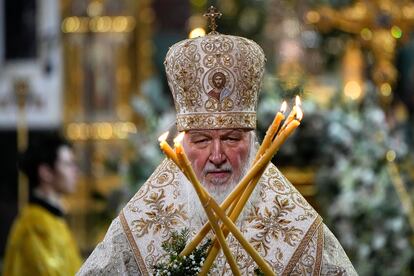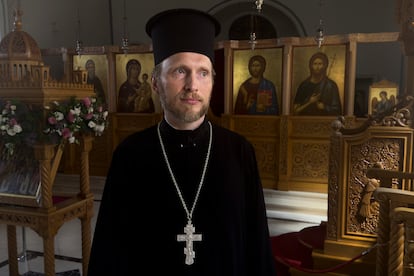Priests defying Putin’s war face persecution in Russia: ‘You can’t kill, period’
The Kremlin and the Russian Orthodox Church have persecuted dozens of clergy who called for peace. Ecclesiastical courts strip them of their guarantees


The Bible says “you shall not kill,” but in the churches of the Russian Orthodox Church, it is mandatory to pray for the victory of the invaders in the war in Ukraine. “O God, rise to the aid of your people and grant us victory by your power,” says the Prayer for Holy Rus, a prayer imposed by Patriarch Kirill — the leader of the Russia Orthodox Church — on his clergy at every Mass since 2022, the year the Kremlin launched a full-scale invasion of Ukraine. An unknown priest, Ioann Koval, dared to replace the word “victory” with “peace” and was personally expelled by the supreme leader.
Dozens more religious leaders have been persecuted for calling for an end to the war, and some of them have been imprisoned or blacklisted under the feared label of “foreign agents.” The coordinated repression between Vladimir Putin’s regime and Kirill reaches the last corner of Russia where speaking of peace without fear was still possible: the churches.
“There were problems between Russia and Ukraine, it’s true. For example, the acceptance of the Russian language. But they should have been resolved through negotiations. You can’t go to war! You can’t kill! Period!” Bishop Grigory Mikhnov-Vaitenko emphatically told EL PAÍS after celebrating Sunday Mass before a small group of parishioners in a remote chapel on a St. Petersburg industrial estate.
The cleric drinks tea every Sunday with other Christians. Mikhnov-Vaitenko rose to fame in 2014 for protesting the Russian Orthodox Church’s inaction in the face of Russia’s annexation of Crimea and the Kremlin-initiated war in eastern Ukraine. A year later, he joined the Orthodox Apostolic Church, another religious community independent of the Russian Orthodox Church. On February 16, 2024 — the day opposition figure Alexei Navalny died in prison — Mikhnov-Vaitenko was arrested while heading to hold a memorial service for the president’s great rival at a monument to the victims of political repression. Shortly afterward, the Kremlin declared the bishop a “foreign agent,” which amounts to a sentence of social ostracism.
“I’ve been visiting prisons for over 10 years, helping political prisoners, but now I’m banned,” laments Mikhnov-Vaitenko. The label has made his life miserable: a foreign agent risks arrest and is barred from many public activities.
The cleric found refuge in the Orthodox Apostolic Church, which is independent of the Russian Orthodox Church, although the two share a similar structure: both are registered as “non-commercial religious organizations” with the Russian authorities. However, the Russian Orthodox Church has, in practice, merged with the state, while the Orthodox Apostolic Church risks being shut down for refusing to serve Putin.
“If it happens, then it has happened,” the bishop resigns himself. “Jehovah’s Witnesses are a fairly harmless organization that avoids any involvement with the state and were banned. That fear exists, but that doesn’t mean we should stop our activities or support the war. That won’t be the case.”

According to a report presented to the U.N. by Sergey Chapnin, former deputy director of the Moscow Patriarchate Publishing House (the publishing service of the Russian Orthodox Church), authorities have opened criminal cases against at least 16 clergy members and administrative proceedings against another 30. Added to these are at least 19 canonical trials within the Russian Orthodox Church — a simulation of ordinary courts with no guarantees, according to human rights organizations. This newspaper has sought the Russian Orthodox Church’s response to this situation but received no reply.
Patriarch Kirill suspended priest Dmitri Safronov from his duties for three years for officiating Navalny’s funeral in 2024. Another clergyman, Vladimir Korolyov, rector of the Kazan Cathedral in Tula, was removed after refusing to allow children in his Sunday school to sew camouflage nets and raise money for the war at the Sunday school he founded.
The religious arm of the Kremlin
“A priest was imprisoned for two weeks because in 2014 he posted a photo of the Ukrainian flag on his social media account. No normal person looks for photos from 10 years ago,” says Father Andrei Kordochkin by phone from exile. His organization, Peace for All (Mir Vsem, in Russian), helps other religious people who have been persecuted by the regime and the Russian Orthodox Church.
The goal of the organization is to demonstrate that there is “a voice against war and Putinism” within their church, and to show solidarity with the clergy who can only remain silent. “Anyone who lives in a province can end up ostracized. Not only by the church community, but also by all their neighbors,” says Kordochkin, who warns that priests and their families “can lose their homes and all their livelihoods if they are expelled.”
Among other actions, Peace for All helps religious leaders leave Russia with humanitarian visas. “The persecution in the occupied territories of Ukraine is brutal,” Kordochkin adds.
The priest admits that critics of the war are a minority but argues that they are a troublesome minority for those in power. “A significant portion of the Church supports Putin, that’s clear; but both the state and the Church want to show that there is total support, and that’s not the case. Our activity irritates them because it was one of the last places where there was room for debate,” says Kordochkin.
The Russian Orthodox Church is, legally, a non-profit organization, “but it has its own peculiarities,” explains human rights lawyer Mikhail Benyash, who ironically notes that this organization is registered in the same way as Navalny’s former NGO.
One peculiarity is that it has its own judicial system, the tool used to repress dissident priests. This mechanism doesn’t offer the guarantees of a regular court: trials are held behind closed doors, lawyers are not allowed, “and some evidence presented, such as police protocols, is not allowed to be verified,” says Benyash, who stresses that one of the biggest problems is that the courts are not independent and final decisions are made at the top of the Church hierarchy.
Kirill’s role
Kirill — now the standard-bearer of Russian traditionalism — was responsible for turning the Russian Orthodox Church into the country’s largest importer of alcohol and tobacco after the collapse of the Soviet Union. As head of the Church’s Department for External Relations, Kirill took advantage of the Church’s tax-exempt status to build a business empire that represented billions of rubles.
Three decades later, Kirill is a staunch defender of traditional values and large families. At the end of 2024, he urged people to view a hypothetical nuclear war “from a spiritual point of view” and “not to be discouraged or fear the supposed end of the world.” “The Lord will come in his glory, destroy evil, and judge all nations,” he declared before the World Council of the Russian People, encouraging the faithful to “be warriors of the Lord.”
“I met Kirill in the early 2000s,” Mikhnov-Vaitenko recalls. “I thought he was a very modern person, with a very good analytical mind, very open to Western culture and, in general, to international communication,” adds the clergyman with a sigh, unable to understand the patriarch’s dramatic transformation. “Did he change his mind or was he intimidated? It’s hard to say, but it feels like we’re talking about two different people.”
Mikhnov-Vaitenko senses that many of his colleagues who remain within the Orthodox Church “are very worried [about the war], but they can’t express themselves; they’re trapped by their circumstances.” In any case, he insists he will continue to call for an end to the conflict: “All wars end one day. There’s no other option but to enter into negotiations and seek peace. And the sooner it happens, the better. We pray for it to happen tomorrow. And tomorrow we’ll pray again for the next day. Every day.”
Sign up for our weekly newsletter to get more English-language news coverage from EL PAÍS USA Edition
Tu suscripción se está usando en otro dispositivo
¿Quieres añadir otro usuario a tu suscripción?
Si continúas leyendo en este dispositivo, no se podrá leer en el otro.
FlechaTu suscripción se está usando en otro dispositivo y solo puedes acceder a EL PAÍS desde un dispositivo a la vez.
Si quieres compartir tu cuenta, cambia tu suscripción a la modalidad Premium, así podrás añadir otro usuario. Cada uno accederá con su propia cuenta de email, lo que os permitirá personalizar vuestra experiencia en EL PAÍS.
¿Tienes una suscripción de empresa? Accede aquí para contratar más cuentas.
En el caso de no saber quién está usando tu cuenta, te recomendamos cambiar tu contraseña aquí.
Si decides continuar compartiendo tu cuenta, este mensaje se mostrará en tu dispositivo y en el de la otra persona que está usando tu cuenta de forma indefinida, afectando a tu experiencia de lectura. Puedes consultar aquí los términos y condiciones de la suscripción digital.








































